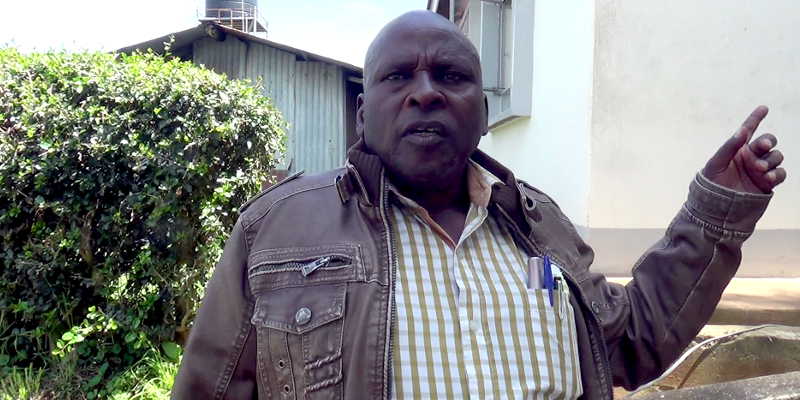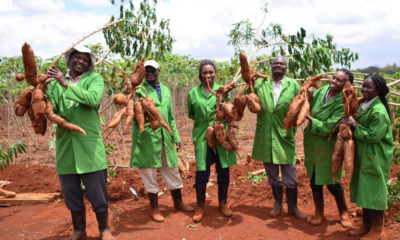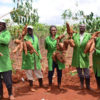News
Ordeal of a potato farmer who harvested 4kgs from 80kgs he planted

Mr. Stephene Tindimubona suffered the ordeal
Farmers narrate ordeals of total destruction of the crop by fungal disease
Stephen Tindimubona planted an 80kg sack of Irish Potatoes in the August-September planting season last year, and hoped to get about a tone but was shocked to harvest just 4kgs from half an acre.
It was an inexplicably huge loss for an experienced farmer such as Tindimubona who had applied the most effective fungicides on the market as well as the best know-how of potato growing.
Tindimubona’s problems stemmed from a centuries-old fungal infection known as potato late blight that attacks Irish Potatoes just before they start to put on tubers.
But Tindimubona is not alone. According to Dr. Alex Barekye, the Director of Research at Kacwekano Agricultural Research and Development Institute, (Kazardi) one of the 16 institutes under the Uganda’s National Agricultural Research Organization (NARO), late blight disease has increased in intensity in recent years due to high humidity and rainfall and has ravaged most farms across Kigezi region.
Indeed many farmers and local politicians fear that at the current speed, the potato late blight disease could wipe out potato farming from Kigezi, if not addressed. And their fears are not too far fetched because the same potato disease caused a catastrophe in Ireland over a century ago known as the Great Irish Famine. History has it that the potato late blight disease was primarily responsible for massive starvation in Ireland between 1845 and 1852 that caused mass migration of people.
The disease that is caused by a fungus called Phytophthora infestans, has troubled potato farmers in Kigezi region for over two decades now, but its destructive effect has risen in recent years, thanks partly to the extreme wet and humid conditions experienced in recent years due to climate change.
Because the disease causes wilting of leaves, it interferes with photosynthesis and therefore stops the process of tuber formation. Since the disease was identified in the region twenty years ago, farmers have been using fungicides to bring the wilt under control as well as rotating the crops. Now, farmers say they have run out of options since fungicides are no longer effective.
A number of farmers from Kigezi region, which accounts for about 60 percent of Uganda’s total Irish potato output, lamented about the devastating effects of the fungal infection. But the problem is compounded by the fact that the disease does not spare seed potato producers such as Tindimubona, who raise planting stock in shelters such as screen houses.
Solution at hand
But just when the farmers were mourning the potential extinction of their most important food crop and biggest source of income for their families, they were enchanted by news that Ugandan scientists have developed a variety that is able to resist the fungal infection for many years and that it requires no spraying.
The farmers were invited to Kacwekano Zonal Agricultural Research an Development Institute (Kazardi) in Kabale last weekend to witness a successful trail of a Genetically Modified Irish Potato variety that has withstood the wilt for the past two consecutive growing seasons.

Ugandan scientists have developed a blight resistant variety as shown by the luxuriant plants in the foreground above. The variety withstood the blight, unlike the ordinary varieties that succumbed to the disease as shown by the bare lines where they had been planted
The researchers showed farmers resistant potatoes standing luxuriantly besides lines of remnants of ordinary potatoes that were totally destroyed by the fungal infection. The scientists explained that blight resistant genes were identified in solanum potatoes, a wild potato variety by scientists at the International Centre for Potato research (CIP) in Peru, and have been integrated into the popular Victoria and Desiree varieties liked by farmers in Kigezi and much of East Africa.
Barekye said that since the genes for resistance in the new variety were obtained from wild relatives of domesticated potatoes, the potential for any risks to food safety are close to zero.
The successful experiment though still locked behind a high fence because of strict regulatory requirements governing trials of Genetically Modified Organisms in Uganda, have triggered great enthusiasm among farmers who got news of it for the first time. Many expressed the view that they need to be given the resistant variety without any further delays.
Joan Bahizi, a seed potato producer from Kisoro district, one of the four top potato growing districts said: “I am excited by the prospect of having a variety that can withstand the wilt and yet it does not require spraying. We had really become confused as to what we should do after fungicides had failed. But the innovation by our scientists is a ray of hope for us because potato is the main source of survival for us.”
Dr. Barekye however warned the farmers that despite the successful trial, they cannot release the new variety because of the absence of an enabling law that would provide for commercialization of genetically modified organisms as required by international protocols.
Barekye’s explanation however did little to deflect excitement of farmers that a solution is within reach. In fact, Tindimubona asked NARO scientists, why they have to delay releasing the resistant variety especially if the gene was obtained from a relative of domesticated potatoes.
The demonstrated ability of Genetic Engineering technology in overcoming a critical obstacle that threatens to wipe out a major source of livelihoods may change the national discussion about whether or not a law should be passed to regulate GMOs.
The Biotechnology and Biosafety Bill 2012, which would regulate GMOs, has faced resistance especially from civil society groups which have relied on propagating unfounded fears that products of the technology are unsafe for human consumption and the environment.
Farmers who witnessed the confined field trial resolved to spread the good news to their peers but also mobilise them to push their own politicians to pass the biotechnology and biosafety act as urgently as possible in order to stop the losses they suffer.
The Chairman of Kabale district Patrick Besigye Keihwa also promised to mobilize councilors to join the petition by farmers to push Parliamentarians for pass the law.
If efforts by Kabale farmers gather enough momentum to have the law in place, their efforts will also benefit other farmers growing crops like bananas, cassava, maize where Ugandan scientists have developed disease resistant varieties using GM technology.
Comments


























